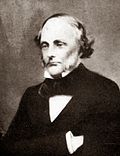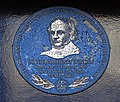William Henry Duncan: Difference between revisions
CSV import |
CSV import |
||
| Line 28: | Line 28: | ||
{{stub}} | {{stub}} | ||
<gallery> | |||
File:William_Henry_Duncan.jpg|William Henry Duncan | |||
File:Court_housing_Liverpool.jpg|Court housing in Liverpool | |||
File:High_Rate_of_Mortality_Liverpool.png|High rate of mortality in Liverpool | |||
File:Minutes_of_Liverpool_Council_Meeting_1843.jpg|Minutes of Liverpool Council Meeting 1843 | |||
File:First_Medical_Officer_for_Health_-_Liverpool_Post.png|First Medical Officer for Health - Liverpool Post | |||
File:Report_to_the_Health_Committee_1851.jpg|Report to the Health Committee 1851 | |||
File:The_Blue_Angel_2018.jpg|The Blue Angel 2018 | |||
File:William_Duncan_plaque,_the_Blue_Angel.jpg|William Duncan plaque, the Blue Angel | |||
File:Doctor_Duncan's,_St_John's_Lane.jpg|Doctor Duncan's, St John's Lane | |||
File:Duncan_plaque,_Liverpool_Medical_Institution.jpg|Duncan plaque, Liverpool Medical Institution | |||
File:William_Henry_Duncan_Building.jpg|William Henry Duncan Building | |||
</gallery> | |||
Latest revision as of 12:14, 18 February 2025
William Henry Duncan (1805 – 1863) was a British physician and the first Medical Officer of Health in England. He is known for his significant contributions to public health reform, particularly in the city of Liverpool.
Early Life and Education[edit]
Duncan was born in Liverpool, England in 1805. He studied medicine at the University of Edinburgh, where he developed an interest in public health and sanitary reform.
Career[edit]
After completing his studies, Duncan returned to Liverpool and began practicing medicine. He quickly became concerned about the poor living conditions in the city and the impact they were having on the health of the population. In 1842, he published a report on the sanitary conditions of the labouring population in Liverpool, which was one of the first comprehensive health reports in England.
In 1847, Duncan was appointed as the first Medical Officer of Health in England. In this role, he implemented a number of public health reforms, including improvements to sanitation and housing conditions. He also played a key role in the establishment of the Liverpool Sanitary Act of 1846, which set a precedent for public health legislation in the UK.
Legacy[edit]
Duncan's work in public health reform had a significant impact on the health of the population in Liverpool and set a precedent for public health legislation in the UK. His efforts are recognised today through the William Duncan Building at the University of Liverpool, which is named in his honour.
References[edit]
<references />
See Also[edit]
|
|
|
-
William Henry Duncan
-
Court housing in Liverpool
-
High rate of mortality in Liverpool
-
Minutes of Liverpool Council Meeting 1843
-
First Medical Officer for Health - Liverpool Post
-
Report to the Health Committee 1851
-
The Blue Angel 2018
-
William Duncan plaque, the Blue Angel
-
Doctor Duncan's, St John's Lane
-
Duncan plaque, Liverpool Medical Institution
-
William Henry Duncan Building













